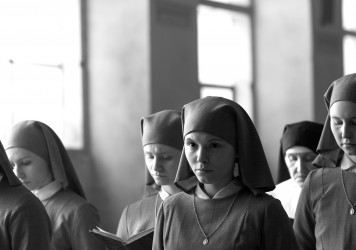Jessica Hausner’s 19th century bourgeois farce offers the perfect blend of humour and romance.
The signature image of writer/director Jessica Hausner’s fact-based, 19th century-set Amour Fou is of a woman’s face obscured by a bouquet of flowers – a suggestive emblem for high society, of perfumed surfaces overlaid on human frailties.
There’s no question that Henriette Vogel (Birte Schnoeink) looks like a delicate blossom, and so she attracts the pest-like attention of the writer Heinrich Kleist (Christian Friedel), a capital-R Romantic poet who propositions this married young woman with a capital-R Romantic scenario: join him in a suicide pact and, in doing so, exercise a measure of control over their otherwise inexorably regimented and predictable lives.
The trick of Amour Fou is that it takes this set-up and treats it as a kind of attenuated small-r romantic farce – the fateful meet cute between a man with great powers of persuasion and a woman looming for something to fall in thrall to. Henriette’s fascination with Kleist’s story ‘The Marquise of O,’ about a courtesan who is violated in her sleep by a man she loves, hints at a submissive fantasy that, in one of this wry film’s numerous high ironies, does not in fact run counter to the attitudes of her countrymen; if anything, Henriette’s apparent yen to be manipulated doubles down on her culture’s privileging of masculine authority.
Prodded by doctors, bewitched by hypnotists and only hesitantly indulged by her husband (Stephan Crossman), Henriette is a frail figure arousing concern but not a lot of curiosity about they mystries of desire.
This is not to say that Amour Fou paints Heinrich Kleist as a heroic libertine; to the contrary, he’s played by Friedel as a weaselly self-mythologiser who is using his new co-conspirator as a sounding board – a way of convincing himself of his own life philosophy. (One of the script’s funniest and apparently authentic touches is that Heinrich approaches several women with his soul-mate spiel – he’s a pick-up artist peddling death-as-transcendence).
Hausner keeps finding ways to expose her anti-hero’s basic feebleness without tipping the film into an explicit critique, and while the film’s icy camera style and puncturing of bourgeois mores (and focus on a suicide pact) may remind some viewers of her fellow Austrian Michael Haneke, she’s at once gentler and funnier when it comes to her characters – which is not to say that the film is soft.
The climax, when it comes, is startling not because of what happens (Vogel and Kleist’s fates can be discovered easily enough) but rather the precise nature of the staging of the climax, which takes the underlying theme of free expression and implodes it in a single instant. The exact opposite of a grace note, it’s a scene which casts the little bit of the film that comes afterwards in shadow – a shade that grows longer and darker in the hours and days after the credits roll.
Published 5 Feb 2015
It’s been a long ol’ while since Austrian director Jessica Hausner graced us with her previous film, Lourdes.
A purse-lipped comedy of 19th century manners and an exploration into the banality of romance.
The surface-level chamber LOLs linger as a mysterious, dark portrait of human foibles.

The Lourdes and Amour Fou filmmaker on her unsettling English-language debut, Little Joe.

A botanist develops a revolutionary new plant in Jessica Hausner’s sci-fi tinged social parable.

A bracing and powerful drama about cultural roots and the nature of identity from director Pawel Pawlikowski.